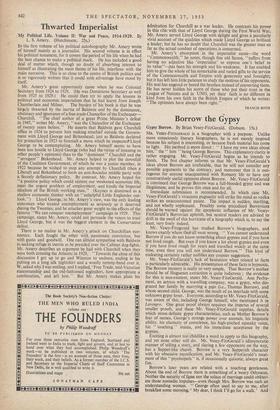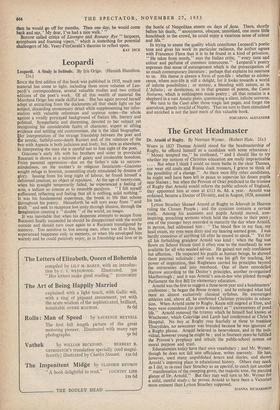Borrow the Gypsy
Gypsy Borrow. By Brian Vesey-FitzGerald. (Dobson. 15s.) MR. VESEY-FITZGERALD is a biographer with a purpose. Unlike more consciously literary biographers, he is not merely inspired because his subject is interesting, or because fresh material has come to light. His method is more direct : " I have my own ideas about him," the " him " being George Borrow. This explanatory clarity is rather engaging. Mr. Vesey-FitzGerald begins as he intends to finish. The first chapter informs us that Mr. Vesey-FitzGerald's ideas about Borrow are irrefutable, that he will not consider any possible arguments to the contrary, and moreover that it is out- rageous for anyone unacquainted with Romany life to have any constructively useful opinions about Borrow. Mr. Vesey-FitzGerald is convinced that George Borrow was a full-blooded gypsy and was illegitimate, and he proves this once and for all.
Immediate submission is recommended. In which case Mr. Vesey-FitzGerald's vivacious pugnacity will strike the mind as vodka strikes an unaccustomed palate. The impact is sudden, startling, and not wholly unpleasant. Possibly some prejudiced Borrovians should be warned against the apoplectic influence of Mr. Vesey- FitzGerald's Borrovian aplomb, but neutral readers are advised to drift in the swell of this hurricane of a biography which is, to say the least, very lively indeed.
Mr. Vesey-Fitzgerald has studied Borrow's biographers, and knows exactly where theTall went wrong. " You cannot understand Borrow if you do not know something about gypsies and if you have not lived rough. But even if you know a lot about gypsies and even if you have lived rough for years and travelled widely at the same time, even then you will not understand Borrow." This kind of endearing certainty rather nullifies any counter suggestion. '
Mr. Vesey-FitzGerald's lack of hesitation when related to facts is particularly admirable. His presentation of these facts is hypnotic. The Borrow mystery is really so very simple. That Borrow's mother should be of Huguenot extraction is quite ludicrous ; the evidence for this is non-existent, states Mr. Vesey-FitzGerald. Ann Perfre- ment, an actress with a travelling company, was a gypsy, who dis- graced her family by marrying a gajo (i.e., Thomas Borrow), and whose second child, George, was the result of an interlude with some unknown gypsy lover. Everyone, according to Mr. Vesey-FitzGerald, was aware of this, including George himself, who mentioned it in Lavengro. One great proof always requires the impetus of several smaller proofs, and these Mr. Vesey-FitzGerald supplies, details which stress definite gypsy characteristics, such as Mother Borrow's fear of names, George's strange power over animals, his linguistic ability, his elasticity of conscience, his high-pitched squeaky voice, his " touching " mania, and his immediate acceptance by the gypsies.
Exciting is almost too childlike a word to apply to this biography, and yet none other will do. Mr. Vesey-FitzGerald's idiosyncratic manner of telling a story, and slaying a few opponents on the way, has a Sapper-like charm. Borrow is a very Sapperish character with his obsessive mystification, and Mr. Vesey-FitzGerald's treat- ment of this "psychopath" is, if occasionally quixotic, always great fun.
Borrow's later years are related with a touching gentleness. About the end of Borrow there is something of a weary Odysseus. Neither the security of fame nor the solace of marriage could obliter- ate those nomadic impulses—even though Mrs. Borrow was such an understanding woman. " George often used to say to me, after breakfast some morning,' My dear, I think I'll go for a walk.' And then he would go off for months. Then one day, he would come back and say, My dear, I've had a nice walk.' " Borrow called critics of Lavengro and Romany Rye " lacqueys, sycophants and foaming vipers," which is something for potential challengers of Mr. Vesey-FitzGerald's theories to reflect upon.
KAY DICK

































 Previous page
Previous page